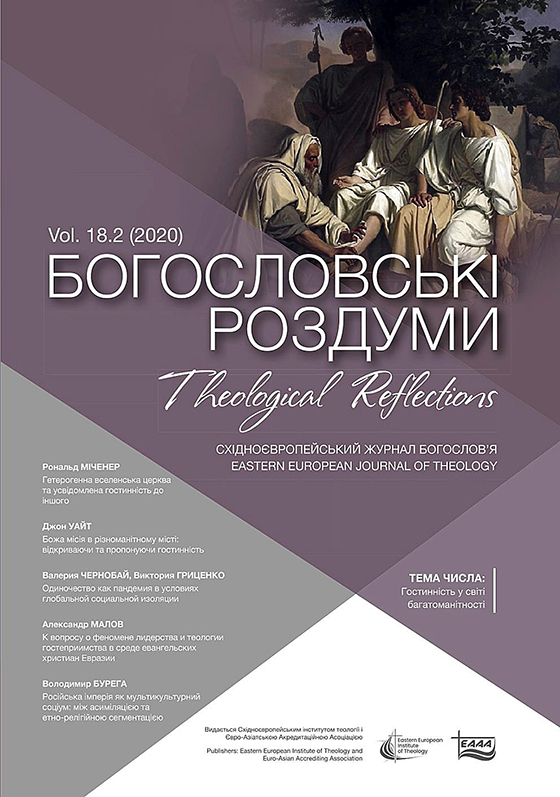On the Phenomenon of Leadership and the Theology of Hospitality among Evangelical Christians of Eurasia
DOI:
https://doi.org/10.29357/2521-179X.2020.v18.2.4Keywords:
leadership, hospitality, inclusive leadership, Christian leadership, acceptance, tolerance, evangelical Christians, cultural differences, diversityAbstract
The goal of this article is to analyze how views about leadership endorsed by evangelical Christians in Eurasia (countries of the former Soviet Union) correlate with the exercise of hospitality. Also, it provides brief recommendations for inclusive leadership formation based on the Gospel. In this article, hospitality is understood as an open and friendly attitude towards individuals whose cultural or physical characteristics are different from those of the leaders or communities; the term “inclusive leadership” is used as an equivalent of the philosophical concept “hospitality.” The premise of the paper is the conviction that hospitality is necessary for the development and practice of moral and effective leadership. To complete this article, materials of two research projects done by Hodos Institute were used. Although these research projects did not directly address the subject of hospitality, they contained questions about the nature, formation, and development of leadership. The results of our analysis demonstrated that only a few evangelical Christians in the former Soviet Union associate leadership with hospitality. In conclusion, we suggested some recommendations for the development of inclusive leadership. Namely, evangelical Christians in Eurasia have to rethink/reinterpret individual and organizational leadership in light of the Gospel message that removes barriers between people and creates conditions for the practice of “hospital,” inclusive leadership.References
- REFERENCES
- Bennis, Warren. On Becoming a Leader. New York. Basic Books. 2009.
- Bevans, Stephen. “A Theology of Leadership, Not Management: Trinitarian Mission and Baptismal Discipleship.” Annales Missiologici Posnanienses. No. 22 (January 2017).
- Derrida, Jacques, and Dufourmantelle, Anne. Of Hospitality: Anne Dufourmantelle invites Jacques Derrida to respond. Stanford. Stanford University Press. 2000.
- Ferdman, Bernardo, and Deane, Barbara. Diversity at Work: The Practice of Inclusion. San Francisco. Jossey-Bass. 2014.
- Fry, Louis. “Toward a Theory of Spiritual Leadership.” The Leadership Quarterly. No.14 (December 2003).
- Gill, Roger. “Izuchenie liderstva v kontekste literatury po liderologii.” v Obshchie i spetsial’nye metody izucheniia liderstva [“Studying Leadership in the Context of Literature on Leadership Studies.” In General and Special Methods of Studying Leadership]. pod red. Krasnikova, Iuliia, I Negrov, Aleksandr. SPb.: SPbKhU. 2015. [In Russian]
- Gotsis, George, and Grimani, Katerina. “Diversity as an Aspect of Effective Leadership: Integrating and Moving Forward.” Leadership & Organization Development Journal. No. 2. (January 2016).
- Gotsis, George, and Grimani, Katerina. “The Role of Spiritual Leadership in Fostering Inclusive Workplaces.” Personnel Review. No. 5 (November 2017).
- Hollander, Edwin. Inclusive Leadership: The Essential Leader-Follower Relationship. New York. Routledge. 2009.
- Khromtsova, Marina. “Tema gostepriimstva v sovremennoi teologii” [“Theme of Hospitality in Contemporary Theology”]. Vestnik Russkoi khristianskoi gumanitarnoi akademii. No. 20 (2019). [In Russian]
- Lashley, Conrad. The Routledge Handbook of Hospitality Studies. NY: Routledge. 2017.
- Negrov, Aleksandr. “Dukhovnost’ i organizatsionnoe liderstvo.” v Nravstvennoe i dukhovnye aspekty liderstva [“Spirituality and Organizational Leadership.” In Ethical and Spiritual Aspects of Leadership]. Krasnikova, Iuliia et al. SPb.: SPbKhU. 2014. [In Russian]
- Negrov, Aleksandr. “Osnovnye idei teorii dukhovnogo liderstva Luisa Fraia.” v Nravstvennye I dukhovnye aspekty liderstva [“Main Ideas of Louis Fry’s Theory of Spiritual Leadership.” In Ethical and Spiritual Aspects of Leadership]. Krasnikova, Iuliia et al. SPb.: SPbKhU. 2014. [In Russian]
- Negrov, Aleksandr, i Belov, Aleksei. Fenomen liderstva v srede evangel’skikh khristian Evrazii: sbornik interv’iu [Phenomenon of Leadership Among Evangelical Christians of Eurasia: A Collection of Interviews]. SPb.: SPbKhU. 2016. [In Russian]
- Negrov, Aleksandr (red.). Fenomen liderstva v srede evangel’skikh khristian Evrazii: kollektivnaia monografiia [Phenomenon of Leadership Among Evangelical Christians of Eurasia: A Collective Monograph]. SPb.: SPbKhU. 2016. [In Russian]
- Negrov, Aleksandr, i Belov, Aleksei. Fenomen liderstva v srede evangel’skikh khristian Evrazii: po materialam interv’iu, focus-grupp i onlayn-anketirovaniia [Phenomenon of Leadership Among Evangelical Christians of Eurasia: According to Materials of Interviews, Focus Groups, and Online Questionnaires]. SPb.: SPbKhU. 2016. [In Russian]
- Negrov, Aleksandr, i Belov, Aleksei. Formirovanie liderstva v srede evangel’skoi molodezhy Evrazii: printsipy i rekomendatsii [Formation of Leadership Among Evangelical Youth of Eurasia]. SPb.: SPbKhU. 2017. [In Russian]
- Negrov, Aleksandr, i Belov, Aleksei. Nastavnichestvo i missiia v professii: perspektivy, issledovaniia i rekomendatsii [Mentorship and Mission in Profession: Perspectives, Research, and Recommendations]. SPb.: Hodos Institute. 2019. [In Russian]
- Ziziulas, Ioann. Obshchenie I inakovost’. Novye ocherki o lichnosti i tserkvi [Communion and Otherness. Further Studies in Personhood and the Church]. M.: BBI, 2012. [In Russian]
- Zohar, Danah. “Spiritually Intelligent Leadership.” Leader to Leader. No. 38 (September 2005).
Downloads
Published
How to Cite
Issue
Section
License
Copyright (c) 2020 Александр МАЛОВ

This work is licensed under a Creative Commons Attribution-NonCommercial 4.0 International License.
All articles published in the Journal are distributed under a Creative Commons Attribution-NonCommercial 4.0 International License
By submitting an article for publication in Theological Reflections: Eastern European Journal of Theology the author grants the editors the right to publish the article and distribute it in electronic and print form.
The author reserves all copyrights and the right to use the materials of the article in whole or in part for educational purposes, to write his own dissertations, to prepare abstracts, conference reports, oral presentations, etc., as well as post electronic copies of articles (including the final electronic version downloaded from the journal’s official website) on non-commercial web-resources without the consent of the editorial board and founders.



